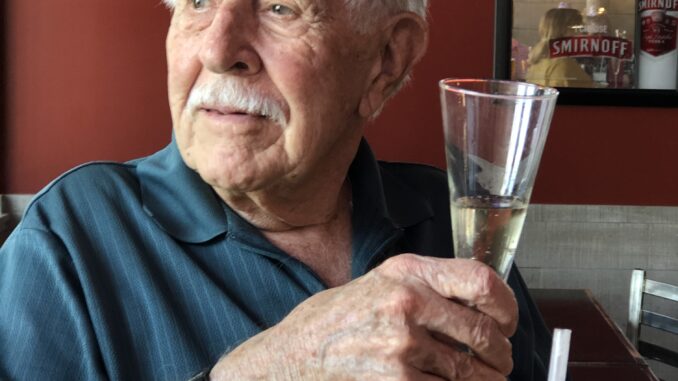
Wasting Away In Obscurity
Before my wife was admitted to a memory care center, there to live for an indefinite, but likely permanent period, I never gave much serious thought to their side of the world, that walled-in space inside of which she and millions of others would exist – but not necessarily have a life, much less thrive – for the rest of their natural lives. But in the past eighteen months I have had to learn the harsh realities of life in places where both our loved ones, and ourselves on the outside, are promised the best of skilled care, along with a wide range of activities lovingly delivered by a staff that really cares.
Well, that depends on a range of factors, some of which, admittedly, are not the fault of the professional caregivers. I’d like to share with you some observations on these facilities, along with the hope for a better day.
At the outset, a standing ovation in support of the dedicated souls who give so much of themselves to give our loved ones support and sustenance. These caregivers are generally, and shamefully, underpaid. In these times of pandemic, they are also working short-handed, which means extra shifts or a diminution of services provided, or both. Many of them have little experience, and minimal training, in dealing with many of the vagaries of aging that are life-shortening. Adding to their collective burden is the startling fact that the proliferation of illnesses such as Alzheimers disease has caught us by surprise.
When Social Security was first enacted in the 1930s, our actuary life span was 65, which the government cynically recognized by making that the qualifying age for receipt of benefits. But in the ensuing decades, the miracles of modern medicine and nutrition have resulted in our average citizen now living well into their 80s and beyond. In my case, having outlived Moses, I’m expected to live to 93. And my detractors should take heart; I’m almost there!.
In the days before our newly-found longevity, the occasional exception to the actuarial mean would permit a few souls to live on, and often to become the butt of “geezer” jokes. The septuagenarian or octogenarian of those times were the harbingers of today’s aging proliferation. And in the process, they would often lose their memories, motor skills, and in general, their ability to function as independent people. We didn’t have today’s refined scientific terminology to identify the ailments of aging, so we invented some pretty brutal names, while comedians made a living doing hilarious (we thought) character sketches of the enfeebled relics who had no power to fight back, who had been robbed of their dignity and were ultimately consigned to “looney bins” and “funny farms,” where we didn’t have to look at them and thereby confront our own uncertain futures. Can you remember any of the names we all used to call elderly folks who put bananas in the oven, and lost their dentures every other day? And did we wind up losing our patience with Grandpa when he wet the bed? Most importantly, have we made a lot of progress as a people, in our understanding of the plight of the aging?
There has been many advances made in our knowledge of the associated illnesses which render many older people incapacitated, or at best, with diminishing ability to make it through the day without significant care. We now know the origins and developmental paths of many aspects of the field of dementia, the most vicious, and ultimately fatal, of which has been identified as Alzheimer’s Disease. We can locate the areas of the brain where plaques are formed, how they develop, spread, and kill healthy brain cells. All that information has long been available to the legions of scientists who are actively engaged in research of the disease, and are striving mightily to develop a cure, be it a pill, therapy, surgery, or any combination of these.
Last year there was a medication developed experimentally, and used on numbers of Alzheimer’s test patients. The results have been mixed, but generally unsatisfactory, as the side effect – brain bleeding – made the cure worse than the sickness. But it was a start, and medical science is hopeful that the breakthrough will come in time to save many lives.
The cynic within me is asking, have we not let ourselves become distracted in this endeavor by the onset of the coronavirus pandemic, and the onset of war in Eastern Europe? With all respect to the developers of the vaccine that is effective against the virus, and has been made available to the public in such a short time, have we, perhaps, veered away from the maximum effort we need to find the dementia cure(s)? Just wondering – I really don’t want to start thinking that way.
But there’s another, more sinister line of thinking, which was verbalized by a former president not too long ago. He said, “Well, they’ve lived their lives.” This statement has been widely interpreted as supporting a “warehousing” or even “abandonment” mentality. And we’ve heard similar comments made by members of the public who don’t advocate spending a lot of money on care for people who have outlived their usefulness.
Evidence of this line of thought exists graphically, in the overwhelming numbers of care center residents who never have visitors. Without such stimulation and the love of family, the abandoned senior is likely to give up on life and will themselves to pass away. There is an old Charlton Heston movie called “Soylent Green” that takes this point of view to a macabre conclusion. Just saying.
The arguments in favor of extending the useful lives of those afflicted with the ravages of aging are many, as well as most persuasive, especially in the eyes of the agingmembers of society. We, the ancient and allegedly enfeebled, are not ready to curl up in a ball and wait for the end. We want to be active, to have full use of our faculties, to give back to the community of the immense store of knowledge that we have acquired during our lifetimes. In pure economic terms, our lack of useful activity is a drain on the resources of the country, whereas a continued productive life, whether compensated or voluntary, would make us a valuable commodity, as well as saving on the burgeoning costs of letting seniors lapse into catatonia, as the bell tolls for them.
The cure may be developed in my lifetime, but my concern is for the return to full activity of the beautiful, vibrant, intelligent and creative woman who has been my companion, helpmate, lover and best friend for these many years. I speak for all the spouses and family members who are standing by to start rejoicing over the return of their loved ones from the captivity of this dreadful disease. If you are inclined toward prayer, the messages you send to The Creator will surely be heard and answered.
George Thatcher, 2022
George is an American Bad Ass. He grew up in Jersey, flew B-52s in Vietnam, taught English, Spanish and other languages to children around the world, makes his own salsa, has been known to enjoy a beer or two and has called Lubbock home for a few years, just to entertain the locals. Welcome to Raiderland, Major. We are going to feature some of his writings going forward. Some new, some old. Some rhyme, some don’t. When it comes to George, there’s no box. So… enjoy our friend and enjoy his writings! – Hyatt




This is beautiful, Dad. My heart breaks for you and so many other spouses and families whose loved ones have been ravaged and robbed of life by Alzheimer’s. Thank you, Ryan, for being such a great friend to GT and for allowing this “American Bad Ass” to share his stories with your readers.
It’s an honor to call him friend!
Hyatt
😀
Good article. We need a cure instead of a warehouse.